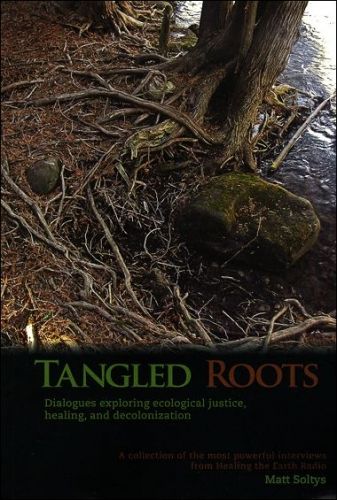STORY about ArtsDirect ActionEducationEnvironmentFoodGenderHealthIdeasIndigenouspublié le Septembre 8, 2012 by Comrade Black
Tangled Roots: Dialogues exploring ecological justice, healing, and decolonization
book review
When I first picked up this book I was immediately excited, I couldn’t wait to dig in. Featuring interviews with many radical thinkers & activists who have already positively influenced my thinking, and many more I had never heard of, the pages promised to entice. Right from the beautiful cover of the book onward it looked promising. Aesthetically, the book is beautiful, the imagery on the cover, and the artwork all throughout sets the tone for the diverse interviews contained within. A quick glance of the table of contents reveals topics ranging from the connection between permaculture and healing from trauma, to decolonization, ecological collapse, domestication, civilization and the impending ecological collapse, to militant resistance and the importance of having an intersectional analysis. If I wasn’t already sold on the book by this point the promotional blurb on the back cover by Gord Hill, author of Anti-Capitalist Resistance and 500 Years of Resistance, definitely sealed the deal for me.
The book is the culmination of interviews by Matt Soltys; an activist from Guelph, Ontario, conducted primarily for his show Healing The Earth Radio. I have had the pleasure of meeting Matt on a few occasions, and must start by saying that he is an incredibly easy person to like, and it seems this opinion is widely echoed by nearly everyone I know who has also met him. It pleases me to know the author is a well respected person within his community.
Interviews are definitely one of my favorite styles of non-fiction writing when they are well done. And I have for years been a big fan of anthologies and compellations, mostly because if you dislike one article, author or interview, you don’t have to drudge through another 150 pages of that writer. The format lends itself well to presenting a diversity of thought, yet there is a strong continuity and excellent flow from interview to interview. That said, I definitely disagreed strongly with many of the perspectives put forward by a lot of the interviewees contained within, especially towards the beginning of the book. The book is organized in a way that seems to be designed to guide the reader from a more moderate position to an increasingly more radical or militant position; to ease them into ideas that they may otherwise be shut off to. Perhaps this might work well for readers coming from more of a mainstream social ‘justice perspective,’ yet I found it took away a lot from the overall book.
There were definitely some excellent interviews in there: Jeff Luers, Ramona Africa, Waziyatawin, and Kanahus Pelkly all have so much to offer, yet these are the last 4 in the book. Many of the interviews in the earlier part of the book I found very liberal, right down to suggesting we need to pressure governments into passing better policy. Considering how much excellent content there was in the book I thought this took away from it, and would likely have caused many radicals to shut off and put down the book before getting to the good stuff later on. I found much of the language in the earlier part of the book to be exceptionally reformist, and at times the way that anti-oppressive theory was presented seemed to be targeted towards an audience who is trained through formal education. If you can get through those problematic pieces, there are many interviews that are worth the cover price by themselves. There was also many interviews I learned a lot from: B. Blake, Levitt’s piece about electromagnetic pollution, and Steven Buhner’s follow up article on using the heart as an organ of perception both spoke to me, and there was many other interviews I found both problematic yet containing some real gems. Many of the articles I disagreed with still made me think.
As a queer identified person I did find it frustrating that the people featured in this book only seemed to use very heteronormative examples, especially considering the emphasis on intersectionality and including marginalized voices.
While I personally would have enjoyed the read more without some of the more moderate interviews, I feel that any book that gets people to read Ramona Africa, Jeff Luers, and some of the others that Matt Soltys spoke with is a worthwhile project. Many of the ideas contained within will be familiar to anyone who has read books by Matt Hern, John Zerzan, Layla Abdel Rahim, as well as ideas addressed in early writings of Derrick Jensen. Anyone new to these ideas would find much to challenge their thinking.
Earth our body
Water our blood
Air our breath
Fire our spirit
- Inscription from the first page
- Vous devez vous identifier ou créer un compte pour écrire des commentaires
The site for the Vancouver local of The Media Co-op has been archived and will no longer be updated. Please visit the main Media Co-op website to learn more about the organization.
